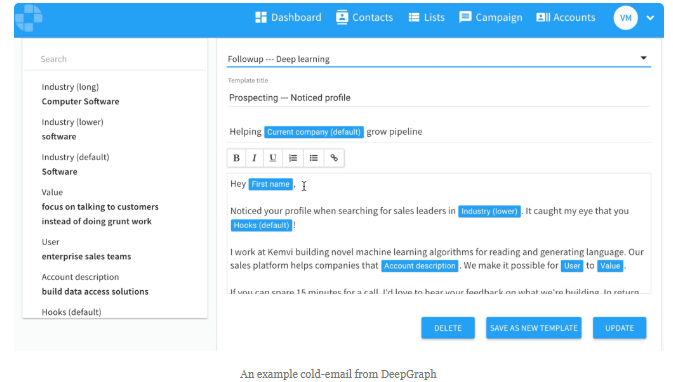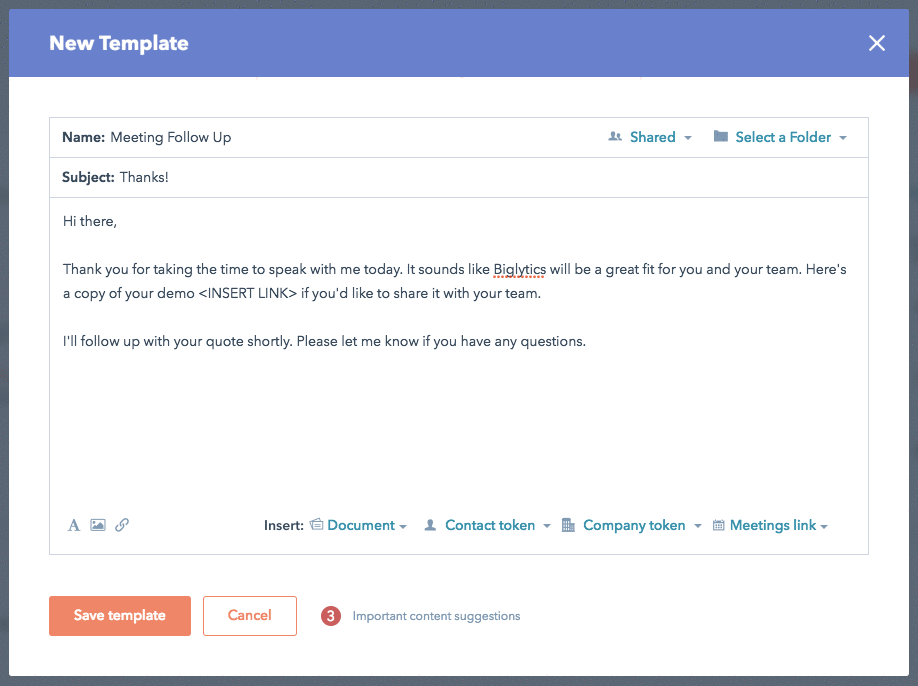HubSpot Buys an AI Startup to Empower Modern Salespeople
The term Artificial Intelligence (AI) was coined by John McCarthy in 1956 who once said: “as  soon as it works, no one calls it AI anymore.” I guess, we are getting there as according to a HubSpot survey of 1,400 consumers, 63% of respondents who said they didn’t use AI technologies were actually using AI without realizing it. Moreover, there isn’t a day that goes by without news about how artificial intelligence is transforming every aspect of our daily lives, and yesterday was no different as HubSpot announced that it has acquired Kemvi, a startup applying artificial intelligence and machine learning to help sales teams.
soon as it works, no one calls it AI anymore.” I guess, we are getting there as according to a HubSpot survey of 1,400 consumers, 63% of respondents who said they didn’t use AI technologies were actually using AI without realizing it. Moreover, there isn’t a day that goes by without news about how artificial intelligence is transforming every aspect of our daily lives, and yesterday was no different as HubSpot announced that it has acquired Kemvi, a startup applying artificial intelligence and machine learning to help sales teams.
Since it is not always feasible for sales reps to keep up with everything happening with their prospects, Kemvi’s machine learning algorithms exact information from text such as blog posts, SEC filings, press releases, and company websites like a human does. Even though the California-based artificial intelligence startup has only raised a small amount of seed funding so far, its DeepGraph engine seems to be perfectly fit into HubSpot CRM as the product doesn’t only extract meaningful information and insights from any piece of digital text but also incorporates that with data and knowledge from companies’ own internal sales and marketing teams to predict buyers’ behavior patterns, so salespeople could establish more contextual, empathetic interactions with their contacts. According to HubSpot, DeepGraph also provides suggestions for creating personalized emails, identifies new market segments, freeing up time that can be spent on more valuable sales tasks.

“Today’s consumers expect a personalized experience throughout the buying process, meaning that the modern salesperson needs to spend valuable time conducting research and tailoring each interaction with that buyer. AI optimizes that process, saving time for the salesperson and delivering a world-class experience for the consumer,” said Brian Halligan, co-founder and CEO of HubSpot. “Kemvi’s DeepGraph technology gives salespeople that added boost to better connect with their prospects and close the deal without getting bogged down in time-consuming tasks. We’re excited to bring this technology into the HubSpot ecosystem, and look forward to working with the Kemvi team to build even more tools to empower the modern salesperson.”
that the modern salesperson needs to spend valuable time conducting research and tailoring each interaction with that buyer. AI optimizes that process, saving time for the salesperson and delivering a world-class experience for the consumer,” said Brian Halligan, co-founder and CEO of HubSpot. “Kemvi’s DeepGraph technology gives salespeople that added boost to better connect with their prospects and close the deal without getting bogged down in time-consuming tasks. We’re excited to bring this technology into the HubSpot ecosystem, and look forward to working with the Kemvi team to build even more tools to empower the modern salesperson.”
Behind the Scenes of DeepGraph
Behind the scenes, the product maps all the important events of the prospect businesses such as organizational changes, stock fluctuations, partnership or acquisition deals, and so on by scouring the web. From there, it transforms this public information into meaningful and actionable insights that may lead a business to make a future decision. The primary point of having this technology in place is to take the guesswork out of the sales process and enables sales teams to deliver smarter customer experiences across sales interactions. At the end of the day, even a wonderfully planned interaction addressing the wrong need will fail. Being able to predict a likelihood of conversion through a particular content even before it takes place helps sales professionals win the hearts of their customers. Therefore, 46 percent of business and technology professionals have identified marketing/sales as a top area for the evaluation or investment in AI technologies, according to a report from Forrester, entitled "AI Must Learn The Basics Before It Can Transform Marketing".
Gartner also predicts that “30 percent of all companies will employ AI to augment at least one of their primary sales processes by 2020.” As being able to learn without being explicitly programmed, machine learning can access, analyze, and find patterns by extracting information from Big Data in a way that is even beyond human capabilities. That way, sales professionals do not only stand a higher chance of acquiring prospects but also they can avoid negative customer experiences as there is nothing more impulsive than receiving a promotional phone call or email about the company when customers are already experiencing an issue with them. When it comes to nurturing and maintaining existing customers, the technology also helps salespeople keep track of what their customers have been purchasing so they can tap into any possible up-selling scenario by retargeting them with a campaign for complementary products. According to Mckinsey, cross-selling techniques increase sales by 20 percent and profits by 30 percent. As a great example to that, today, Amazon is generating 35 percent of its revenues through its cross-sales and up-selling efforts.

HubSpot Plants the Seeds by Investing in Startups
Considering how AI can leverage CRMs and the emerging demand for intelligent business applications, all the major CRM providers are steering their ships in the very same direction where they muscle up in the battle for automated system supremacy to exploit artificial intelligence technologies such as machine learning. Salesforce, for example, has been acquiring artificial intelligence startups’ products that deeply analyze and measure the engagement of customers across the different channels to make recommendations to the marketing and sales departments, instead of associating a cookie with an audience segment which is how traditional data management platforms work. One of its recent big deals, Krux, for instance, interacts with more than three billion browsers and devices, supports more than 200 billion data collection events, processes more than five billion CRM records and orchestrates more than 200 billion personalized consumer experiences. Microsoft, on the other hand, acquired LinkedIn for $26.2 billion, with an aim to integrate the most popular professional social network with its cloud-based product line, including Office 365 and Dynamics 365. Given LinkedIn has passed 500 million registered users in 200 countries on its platform, Dynamics 365 is expected to dramatically increase the effectiveness of salespeople by tapping into their professional networks and relationships.
In the face of stiff competition in the CRM market, this isn't the first time HubSpot has invested in a startup. In fact, recently, the Cambridge-based company has invested in both the account-based marketing firm Terminus and the B2B sales platform PandaDoc. Through its strategic partnerships and acquisitions, HubSpot is rapidly becoming a central player supporting an array of related sales and marketing software. Co-founder Dharmesh Shah alone has invested in more than 30 startups, including Apperian, InsightSquared, and Backupify. These investments are being made not only for beefing up the HubSpot ecosystem but also for acqui-hiring new talents. Given a talent gap, particularly in emerging technical fields, is an alarming threat for many organizations, HubSpot wants to plant the seeds so it can take advantage of the new talent pool. With this goal in mind, this summer, the software company announced that it would give away $100,000 to an aspiring founder who pitches the best business idea in 25 words or less in response to the video on HubSpot's Facebook page. The winner of HubSpot's competition will also get one-on-one mentorship from a stable of executives and three years of free access to HubSpot's marketing software.
Circling back to the acquisition of Kemvi, as a result of this deal, the two-person Kemvi team, including Vedant Misra, Founder and CEO of Kemvi, will be joining HubSpot, which reported 1,597 employees at the end of 2016, with $271 million in revenue last year and a $45.6 million net loss, to work on bringing the startup’s technology into the HubSpot platform.
“The B2B transaction ecosystem is on the cusp of a complete transformation, and we believe that HubSpot has the right vision and positioning to lead that change,” said Misra. “We're thrilled to be joining the team at HubSpot and look forward to continuing our work at the intersection of machine learning, language, and sales.”
My POV
With more and more vendors injecting intelligence into lead qualification and forecasting processes, the CRM market, today, is embracing predictive selling where brands engage and educate buyers and guide them to optimized, personalized marketing messages, advice, and/or purchase recommendations regarding their products and services, just like Amazon does. Every CRM or marketing technology provider will be required to provide intelligence as part of their solution, otherwise, they will fail. As being an early adopter of this predictive slant on CRM, HubSpot seems to not only remain in the game but also join the big CRM players which lead the pack in the upcoming years.
From a buyer perspective, technologies that can drive efficiencies and provide intelligent recommendations to sellers are winning the hearts and wallets of modern buyers. Having been a person who wrestled a lot with the leading CRM products like Salesforce and Oracle in the past, seeing the focus of vendors that is finally shifting from a sales management tool that is designed around the needs of managers and executives to seller empowerment channel is quite promising for every aspect of sales management.

Venus Tamturk
Venus is the Media Reporter for CMS-Connected, with one of her tasks to write thorough articles by creating the most up-to-date and engaging content using B2B digital marketing. She enjoys increasing brand equity and conversion through the strategic use of social media channels and integrated media marketing plans.